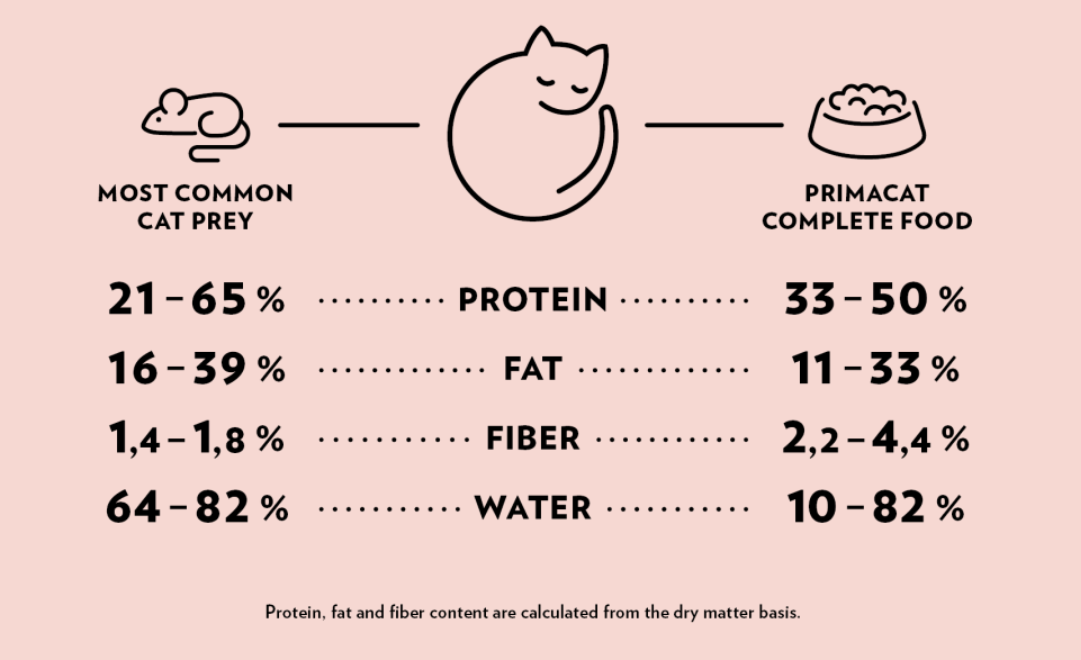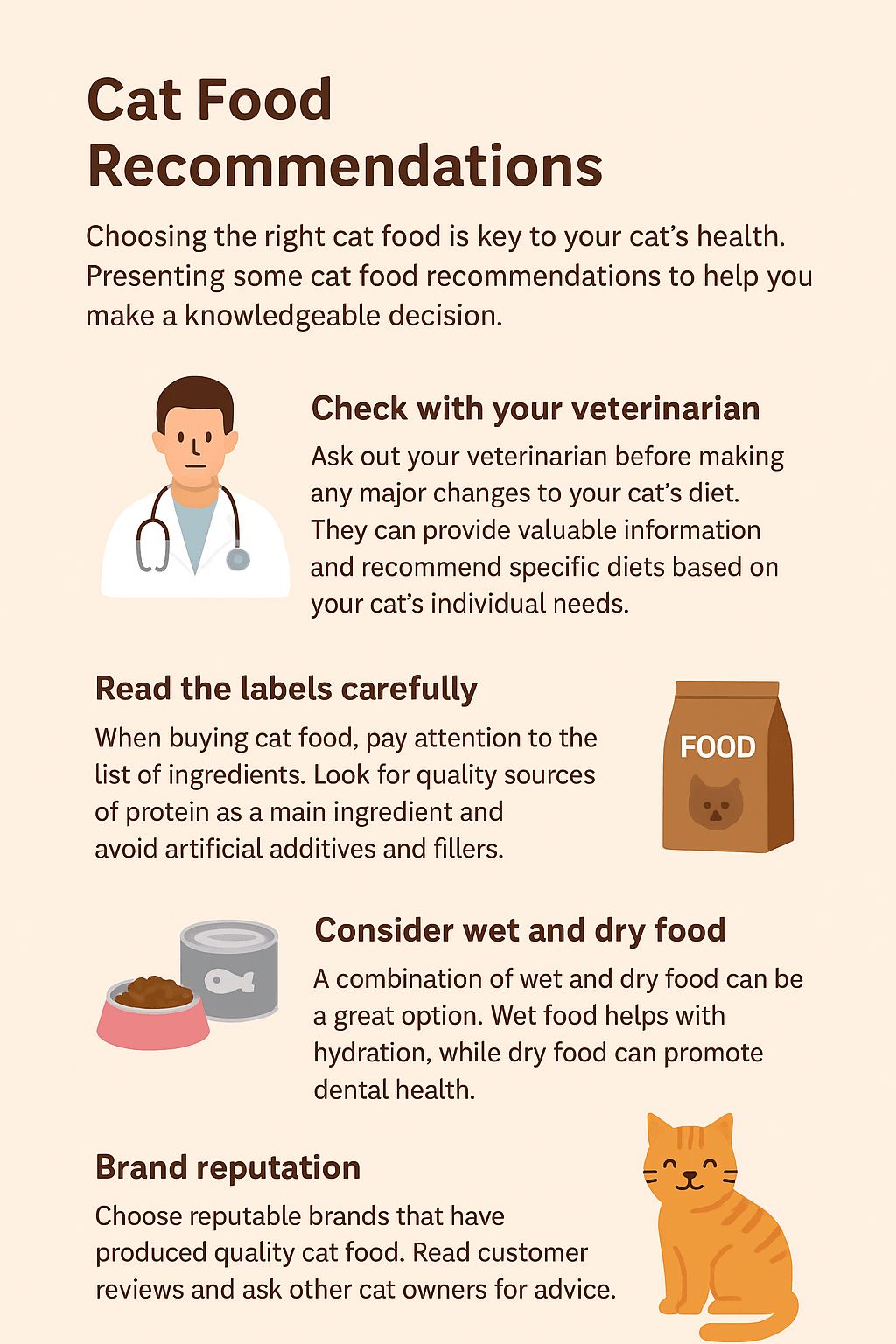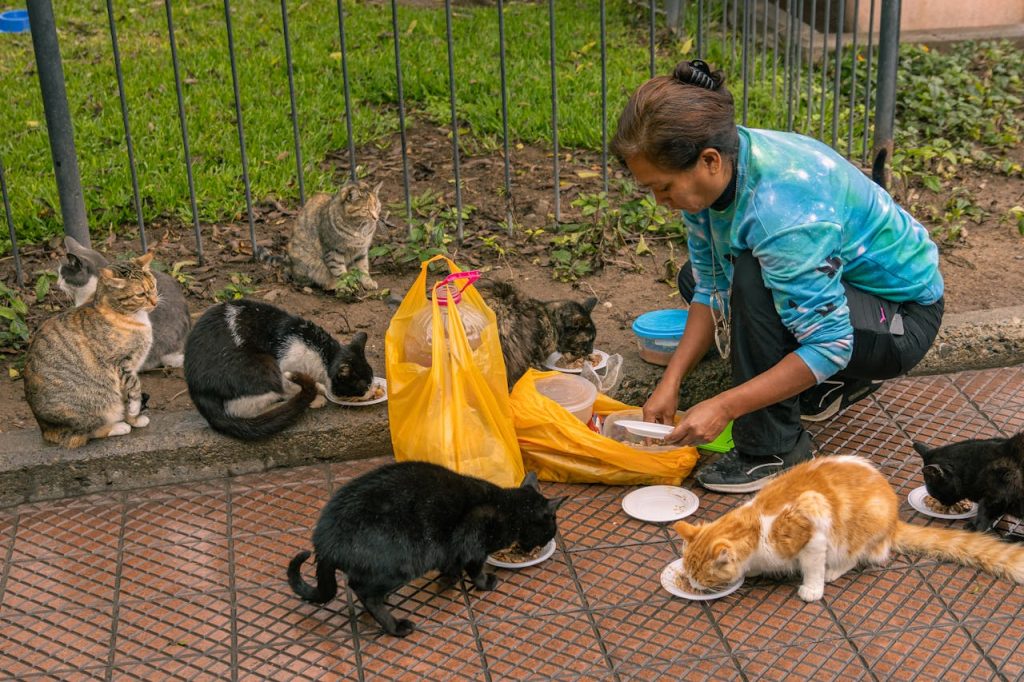Cats are carnivores, so they need animal protein to eat. They need to eat meat to get all the nutrients they need to stay healthy (like taurine and arginine). Without these essential nutrients, they are at risk of serious illness. Fortunately, most commercial cat foods contain all the nutrients your cat needs.
The diet of a typical adult cat should consist of a high-quality protein source with at least 26% amount crude protein daily, and more than 30% is ideal. Fats are also important for their energy needs and should make up about 9% of their diet. Carbohydrates, although not essential, can be included in their diet, but should be less than 10 percent.

What to feed your cats
Feeding and keeping our cats healthy does not just mean they feel good inside and out, it also means they live longer and fuller lives. That equals a lot of hugs and playtime for them and reassurance for you that you are doing a great job as a proud parent. One of the most important ways to ensure the health of our cats is through vet-approved cat food.
Choose food adapted to the life stage of your cat
One of the most important factors related to cat nutrition is the age of the cat. Different stages in their life cycle need different nutrition and they have different activity levels as well. For example, kittens are usually much more active than their older counterparts, and they also need extra food to help them grow quickly. Therefore, it is important to buy balanced food for kittens until they become adult cats.
Older cats also have different nutritional needs. Adult kittens often need more protein to help lose muscle and support the kidney system, while they need less fat and calories to prevent weight gain.
Consider Potential Health Issues
In addition to buying foods that are appropriate for your cat’s life stages, you should also consider any illnesses or sensitivities that your cat may develop over time. Mother cats who are nursing their kittens need a much higher-calorie diet. Other cats need a simpler diet due to allergies. Your veterinarian can help you manage these special needs.

Choosing the right cat food is key to your cat’s health. Presenting some cat food recommendations to help you make a knowledgeable decision.
- Check with your veterinarian: Ask out your veterinarian before making any major changes to your cat’s diet. They can provide valuable information and recommend specific diets based on your cat’s individual needs.
- Read the labels carefully: When buying cat food, pay attention to the list of ingredients. Look for quality sources of protein as a main ingredient and avoid artificial additives and fillers.
- Consider wet and dry food: A combination of wet and dry food can be a great option. Wet food helps with hydration, while dry food can promote dental health.
- Brand reputation: Choose reputable brands that have produced quality cat food. Read customer reviews and ask other cat owners for advice.
Ingredients to look for in cat food
When choosing cat food, choose products which contain high-quality, sustainable,organic, and non-GMO ingredients. Keep in mind the following points when choosing the food that best supports your cat’s health and well-being:
- Quality animal protein sources such as chicken, turkey, lamb, fish, and beef provide essential amino acids for muscle maintenance and repair.
- Whole foods such as fruits and vegetables provide fiber, vitamins, and minerals to support healthy digestion and the immune system.
- Limited and traceable ingredients without artificial additives or preservatives reduce the risk of food sensitivities and indigestion.
- Organic or non-GMO ingredients provide a higher quality, more nutritious food source that supports overall health and well-being.
Special Diets for Special Needs
Just like humans, cats have unique dietary needs at different stages of life and health conditions. Choosing the right food for these situations can make a huge difference in your cat’s overall well-being.
Kittens: Nutrition for Growing Bodies
Kittens need higher levels of protein, fat, and essential nutrients to support rapid growth and development. Look for kitten-specific formulas with:
- High-quality animal protein for muscle growth
- Omega-3 fatty acids (DHA) for brain and vision development
- Calcium and phosphorus for strong bones and teeth
Tip: Feed kittens 3–4 small meals a day until they are about a year old.
Senior Cats: Supporting Aging Gracefully
As cats age (around 7+ years), their metabolism slows, and health issues may appear. Senior cat diets often include:
- Easily digestible proteins to maintain muscle
- Joint-support ingredients like glucosamine and chondroitin
- Lower calorie content to prevent weight gain
Regular vet checkups become crucial during these years to catch early signs of kidney disease, thyroid issues, or arthritis.
Overweight Cats: Weight-Management Diets
Obesity is one of the most common feline health problems, leading to diabetes, joint pain, and reduced lifespan. For overweight cats:
- Choose low-calorie, high-protein food to maintain lean muscle
- Avoid free-feeding; use measured portions
- Consider puzzle feeders to encourage activity
Cats with Allergies or Sensitivities
Food allergies can cause itchy skin, hair loss, and digestive upset. If you suspect an allergy:
- Try a limited-ingredient diet or novel protein source (like duck or rabbit)
- Work with your vet to run a proper food trial
If your cat shows sudden weight loss, lethargy, vomiting, or changes in appetite or urination, consult your veterinarian right away. A vet can recommend prescription diets tailored to your cat’s specific medical needs.
Consult your vet
Just like humans, the best cat food is not one size fits all. Some cats need a different approach to make sure they are eating enough calories (or not too many), while others may benefit from a water-rich diet because of their medications. It’s important to remember that cats’ nutritional needs can change at different stages of their lives, so you should regularly review their diet with your vet.
How to Spot a Bad Diet Early
Catching the signs of poor nutrition early can prevent serious health issues for your cat. A bad diet often shows up in subtle ways first:
- a dull or flaky coat,
- excessive shedding
- low energy levels,
- frequent vomiting
- noticeable weight gain or loss.
You might also see changes in stool quality, bad breath, or a decline in muscle tone.
To keep cat’ healthy use a simple monthly checklist:
- check their coat for shine and softness
- monitor their weight and body shape
- note their appetite and litter box habits
- watch for changes in behavior or energy
If you notice two or more warning signs consistently, it’s time to revisit their diet or consult your vet.
Final Thoughts
Choosing the right diet for your cat isn’t just about filling their bowl. It’s about supporting their long-term health and happiness. From the playful kitten stage to the golden senior years, your cat’s nutritional needs will evolve. So, pay attention to their behavior, weight, and energy levels, and don’t hesitate to consult your veterinarian if something seems off.


